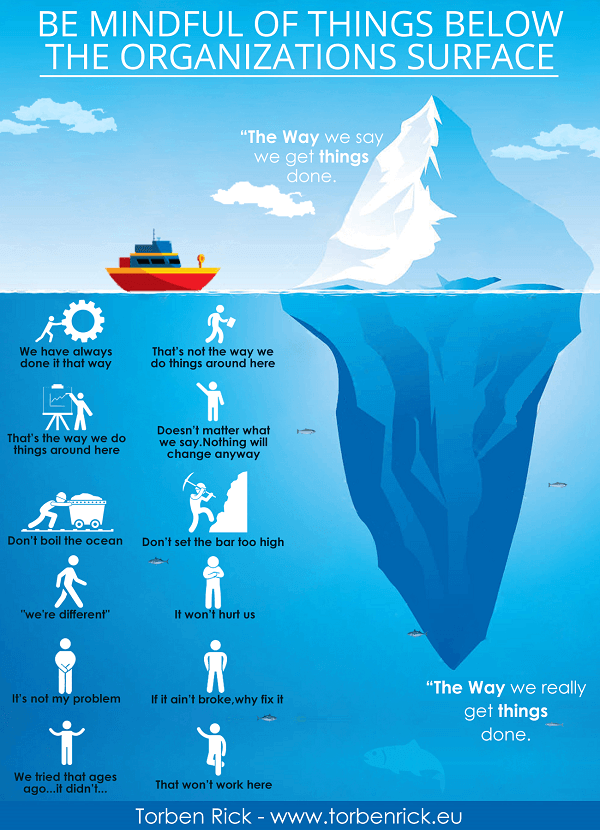Complacency is the worst mistake a business can make
Just ask Digital Equipment Corporation (DEC). By 1990, DEC was riding high, ranked only behind IBM in the computer industry. But under the leadership of Ken Olsen – who once famously derided the emerging personal computer, saying:
There is no reason for any individual to have a computer in his home
DEC stuck with its original vision and its product lines, which were incompatible with emerging operating systems.
Complacency is a dangerous culture
Complacency is a dangerous culture that permeates beyond the walls of mega corporations and extends into the reaches of every day companies and institutions.
Complacency almost always comes from a sense of success and lives long after the success that created it has disappeared. Organizations and individuals that are complacent do not look for new opportunities or hazards.

Below the organizations surface – Complacency is a dangerous culture – When the organizational culture needs to change
A corporate culture of complacency ignores opportunities, big and small
Complacency ignores opportunities, big and small. It turns a blind eye to serious and dangerous threats. It hushes innovative ideas. It stomps on energy, enthusiasm and anything new. It hangs on to the old ways of doing things with white, arthritic knuckles. It doesn’t want to hear or see what is happening in the world. Learning new things is not up for discussion. It is of no concern to those who are complacent.
They are almost always internally focused and they do what has worked for them in the past. They pay insufficient attention to new opportunities and frightening new hazards.
In a talk to employees, Nokia CEO Stephen Elop asked a question that many were probably afraid to answer truthfully, given how Nokia is struggling to combat the iPhone. When he asks how many people in the crowd use an iPhone or Android device, few hands go up:
That upsets me-not because some of you are using iPhones, but because only a small number of people are using iPhones. I’d rather people have the intellectual curiosity to understand what we’re up against.
In a fast-moving and changing world, a sleepy or steadfast contentment with the status quo can create disaster.
The fight against corporate complacency
Some companies seems to be dealing very proactively with complacency – in it’s value statement Northwood has declared “war” against corporate complacency:
If the culture of an organization is one of complacency, and mediocrity, the interaction might be an average, or below average experience. If the culture is one of excellence, commitment, honesty and integrity, the experience will likely be entirely different. The culture at Northwoods will always be the latter of the two. Complacency and mediocrity are not qualities of our employees and therefore will never have a place in our corporate culture
And Hyundai:
We refuse to be complacent, embrace every opportunity for greater challenge, and are confident in achieving our goals with unwavering passion and ingenious thinking
How to avoid a corporate culture of complacency
- Make people feel uncomfortable. People need to be challenged and made less certain
- Cultivate nightmare scenarios – “what if” situations
- Invite skeptical outsiders to comment on what you feel complacent about
- If it ain’t broke, consider breaking it
- Investigate how new disruptive technology could “alter our situation for the better or worse”
- Ask “How could we do this 10 ten times better?”
- Benchmark against someone entirely different, if your present comparison merely re-enforces your certainty
- Don’t just fight complacency, invest in innovation
Don’t fall into the comfortable trap
As Apple launched the iPhone a couple of years ago Microsoft CEO Steve Ballmer was laughing about the launch in an interview with CNBC. Two years later, the iPhone is a huge success and has much more market share than Microsoft in the smartphone segment.
Short URL & title:
Killed by a corporate culture of complacency — https://www.torbenrick.eu/t/r/iuv
Share it:
If you enjoyed this article, please take 5 seconds to share it on your social network. Thanks!








Terrific content. I’ve shared throughout my network. All to often we think of these principles as being solely related to “big business” and not a solo practicers such as my field…”Corporate Executive Coaching” when in fact it is more critical for independents.
CB
Awesome infographic Rick!
Thanks Chery